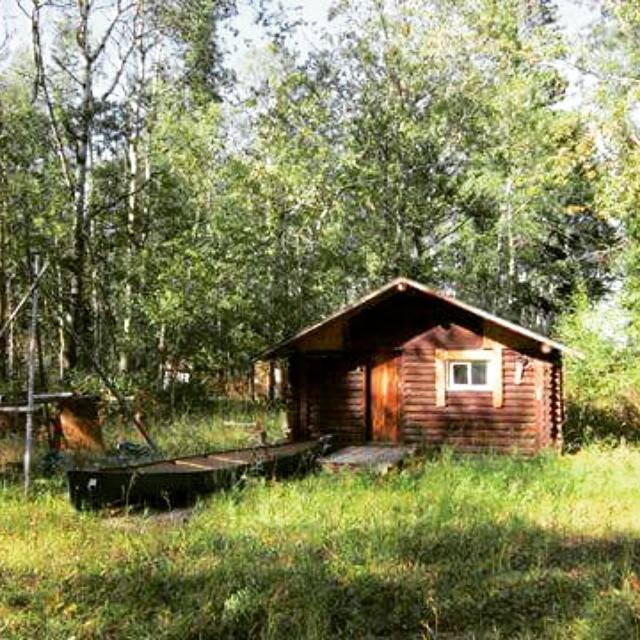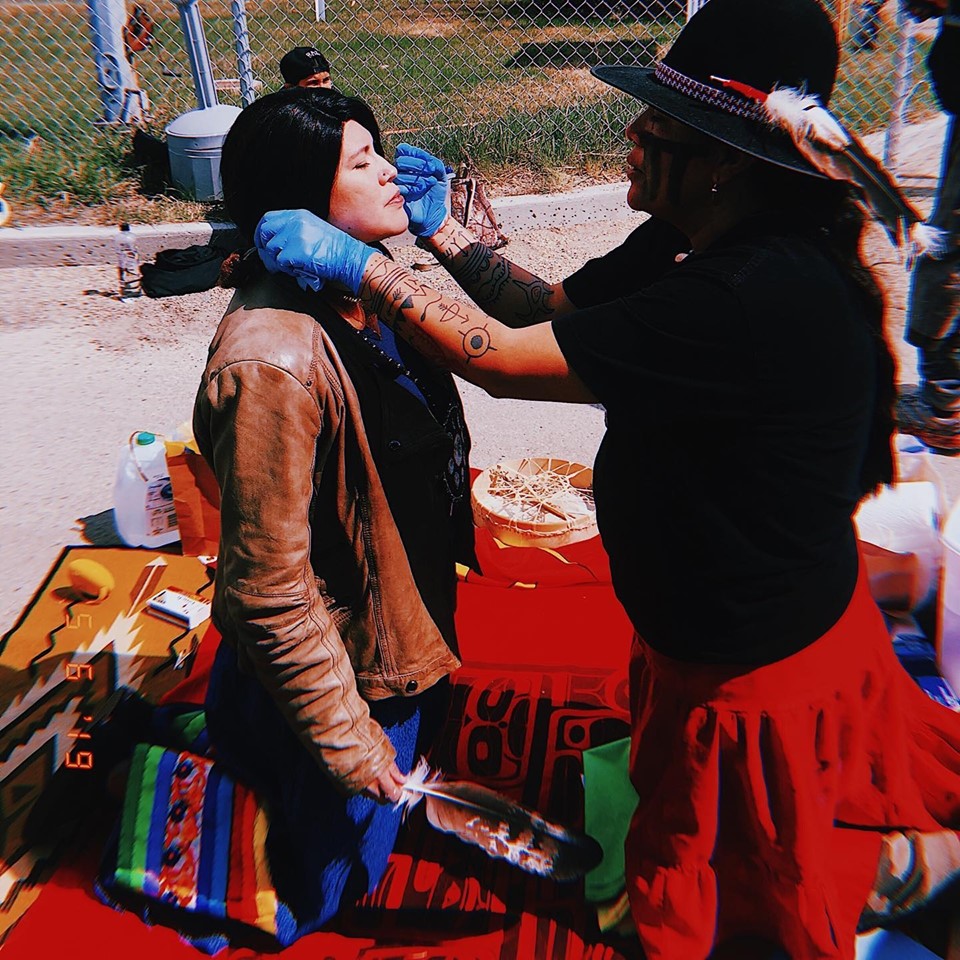The Edmonton Heritage Council’s Communications Coordinator, Molly Staley, had a conversation with Freda Ballantyne, an Edmonton-based Indigenous writer, to discuss National Indigenous Peoples Day and Indigenous Heritage in Edmonton.
The Edmonton Heritage Council acknowledges that we are located at ᐊᒥᐢᑿᒌᐚᐢᑲᐦᐃᑲᐣ, Amiskwacîwâskahikan (Edmonton), on Treaty 6 territory and respects the histories, languages, and cultures of First Nations, Métis, and Inuit, whose presence continues to enrich our shared heritage.
(Above photo: Freda Ballantyne with Kanahaus Freedom Manuel of the Secwepemc Nation)
—
M: Thank you so much for agreeing to chat with me! I wanted to talk to you about a few things, beginning with what the Council does and our commitment to Indigenous people in and around Edmonton.
The Edmonton Heritage Council, in cooperation with the City of Edmonton and its sister organizations the Edmonton Arts Council and Arts Habitat, have committed to a 10-year plan to transform Arts and Heritage in Edmonton. This plan is called Connections & Exchanges. The plan outlines a strategy of a combination of actions, aims, and ambitions. A vital facet of this plan considers Indigenous Cultural Independence. The Edmonton Heritage Council, alongside its sister organizations, have committed to the following:
“Indigenous peoples have agency in their journeys of revitalizing and participating in traditional, contemporary, and future manifestations of their culture.”
What are your first thoughts as both an Indigenous woman but also a writer and artist, to the commitment outlined in this plan?
F: My first thoughts are on reciprocity: as Indigenous peoples, our way of life is dependent on the act of giving and thus receiving in fairness all acts, whether it be cultural or day-to-day. We might keep many things to ourselves because we know the acts of theft amongst others from the stealing of our designs in art and clothing to the act of stealing our stories and using them as their own experiences. At this moment, we are very aware and protective of these cultural assets and honour our creativity and our ancestors because this is where we gain our inspiration.
M: Can you tell us about your experience writing and creating in the Edmonton arts and heritage sectors?
F: I am a freelance writer and have submitted to UBC now named Briarpatch Magazine. Actually, I have not submitted anything to Edmonton arts and heritage. Honestly, I am not aware of sources to engage with, not until I learned about the EHC.
M: What more can organizations such as the EHC do to foster Indigenous work in the heritage sector?
F: I have listened to some Indigenous peoples, and they stated they require spaces to do their work and show their work. For organizations like the EHC to support Indigenous work, they need to work with the people and listen to their needs. Reciprocity is critical.
M: This past Friday, June 21, 2019, was National Indigenous Peoples Day. Celebrations of Indigenous, Métis, and Inuit people took place all over the country, including here in Edmonton. What does this day mean to you?
F: It’s a day of acknowledgement of genocide against Indigenous peoples all over Turtle Island. We celebrate and acknowledge a resiliency of our many indigenous groups, Métis, and Inuit on these lands, but we are mixed in with people who do believe we are still savages without a god. We are in an age of reclamation before reconciliation, and I feel we need this day to let Canada, as a nation state, know that we are still the original stewards of these lands and we will do everything possible to uphold this government to Treaty obligations. We again fight for ceremony to be held and in some isolated areas still feel the toxins from the Catholic Church over our families.
Decolonization isn’t just a hot topic word, we really are in the reclamation of ceremony, art, and literature. This is what brings us closer together, this network of creativity and the networking and sharing that occurs because of these ideas. As a writer, I feel that if my words resonate with another, then I’ve done a good thing in bringing people together with thought and nuance. This country did everything to ruin our networks. Right now, we are working on rebuilding those kinship systems and bringing back our cultural teachings to the forefront for our families, our people, and this benefits the outer society as well.
M: Do you think it is possible to be proud to be Canadian as an Indigenous person?
F: I think homogenous words like Canadian are so embedded in our conscience that some gladly say they are a Canadian citizen to belong to a group, to have an identity. To others who are acutely aware of their own ancestry, their people and territories they will very loudly proclaim they are not Canadian but Nehiyaw Iskwew from kisiskâciwani-sîpiy.
Traditional Cree kinship back in the day meant if we met another Cree on our journey, we would shake hands and sit and find out how we are related. We wanted to see the lines of relation and make friends. This was the way. Now, we don’t have these connections anymore, and it’s a sad revelation that our ways have been replaced by the colonial mentality of consumerism and capitalist gains. We weren’t known to keep to ourselves — our families were huge and the larger your family, the wealthier you were viewed.
I struggle with the word proud concerning the word Canadian. I know this will upset many of my non-Indigenous friends, but I question how I can be proud of a country, which is really a nation state, that doesn’t speak to the original peoples with respect and dignity they demand from us. How can I be proud when I have a Prime Minister who will not be truthful to Indigenous groups defending their lands and territories, thus helping all with climate justice? How can I be proud when I am a Sixties Scoop Survivor and have learned my Aunts and Uncles did their unschooling in Residential Schools, and how do I justify saying the word proud knowing genocide lives here? I don’t believe that people who are aware of history can say the word proud, let alone be proud. We know where we come from, we acknowledge those lands and territories and use Canadian maybe on a passport, but even that is changing.

(Freda’s father’s cabin on the family trapline in Pelican Narrows, Saskatchewan)
M: Is there anything you would like to add either regarding the June 21 celebrations, Indigenous heritage and culture in Edmonton, or anything about yourself and your story?
F: I adore National Indigenous Peoples Day for the same reasons many do: the dancing, regalia, the swishing of fabrics and distinct jingle cones. The drumming, the smell of Indigenous foods. The scent of our medicines permeating public spaces and reminding us to go back to our beginnings. To keep acknowledging our ancestors and praying for our people everywhere.
I spent June 21 this year attending and affirming my first Sundance. As a Sixties Scoop person, it’s been a very tough road finding my lineage, acknowledging the suffering, accepting the pain and walking into my own skin. It’s been harsh and painful but also very enlightening, and I have come to terms with losses also being replaced by gains. Spiritual and familial, physical and ceremonial. I have also learned education isn’t exclusive to a classroom, but everywhere we walk…so walk softly in those moccasins, friends. Acknowledge the Treaty lands you visit and gift the tobacco. Share with your networks and keep your heart wide open to accept but also give freely. Enjoy this day but never hold fear in finding your own paths and journeys. Allow yourself to be a beginner in learning; about other cultures, where we may intersect, about your people; about your authentic self and about decolonizing your thinking and your heart.
M: Thank you, Freda!
To learn more about Freda’s story, click here.
—
Editor’s Note: The Edmonton Heritage Council recognizes our relationship to Treaty 6 and the peoples and territories within the Treaty. The City of Edmonton is on a journey of building good relations with indigenous people – in the spirit and intent of the Edmonton Urban Aboriginal Accord.
